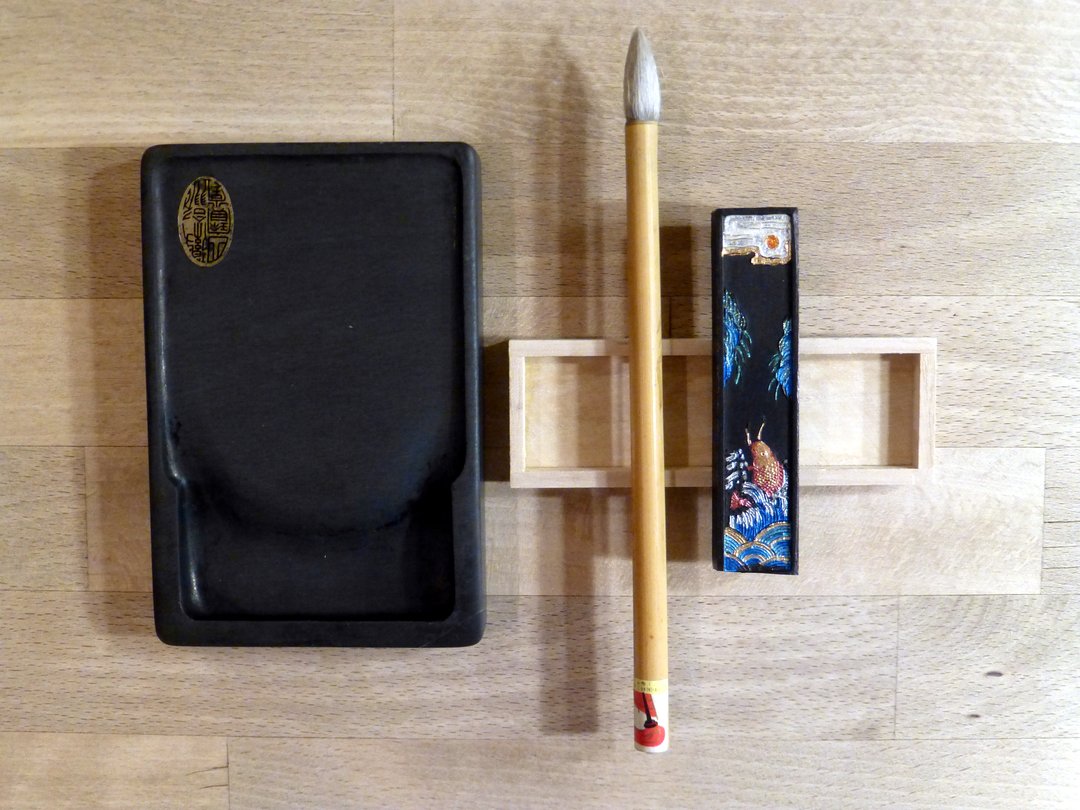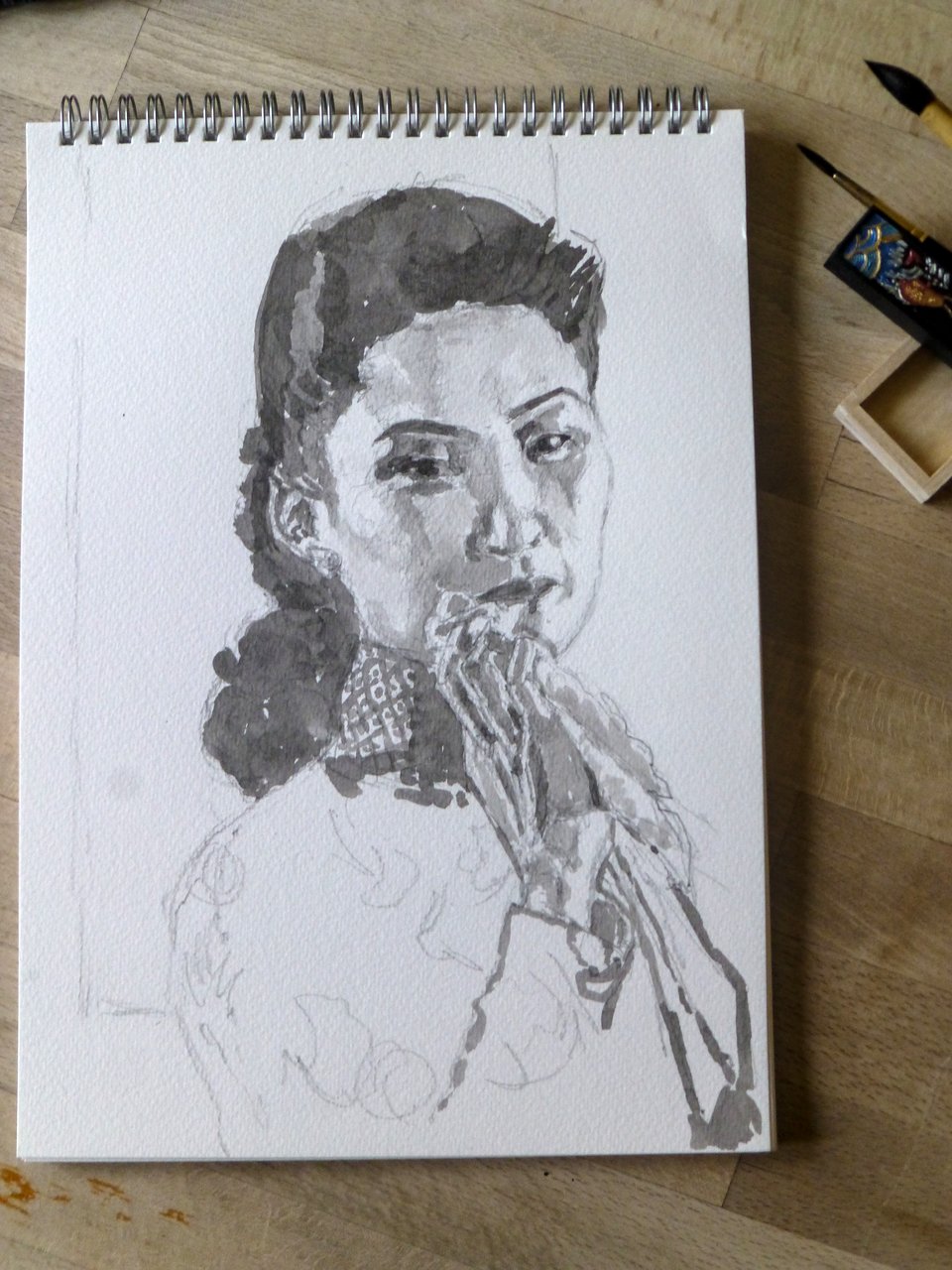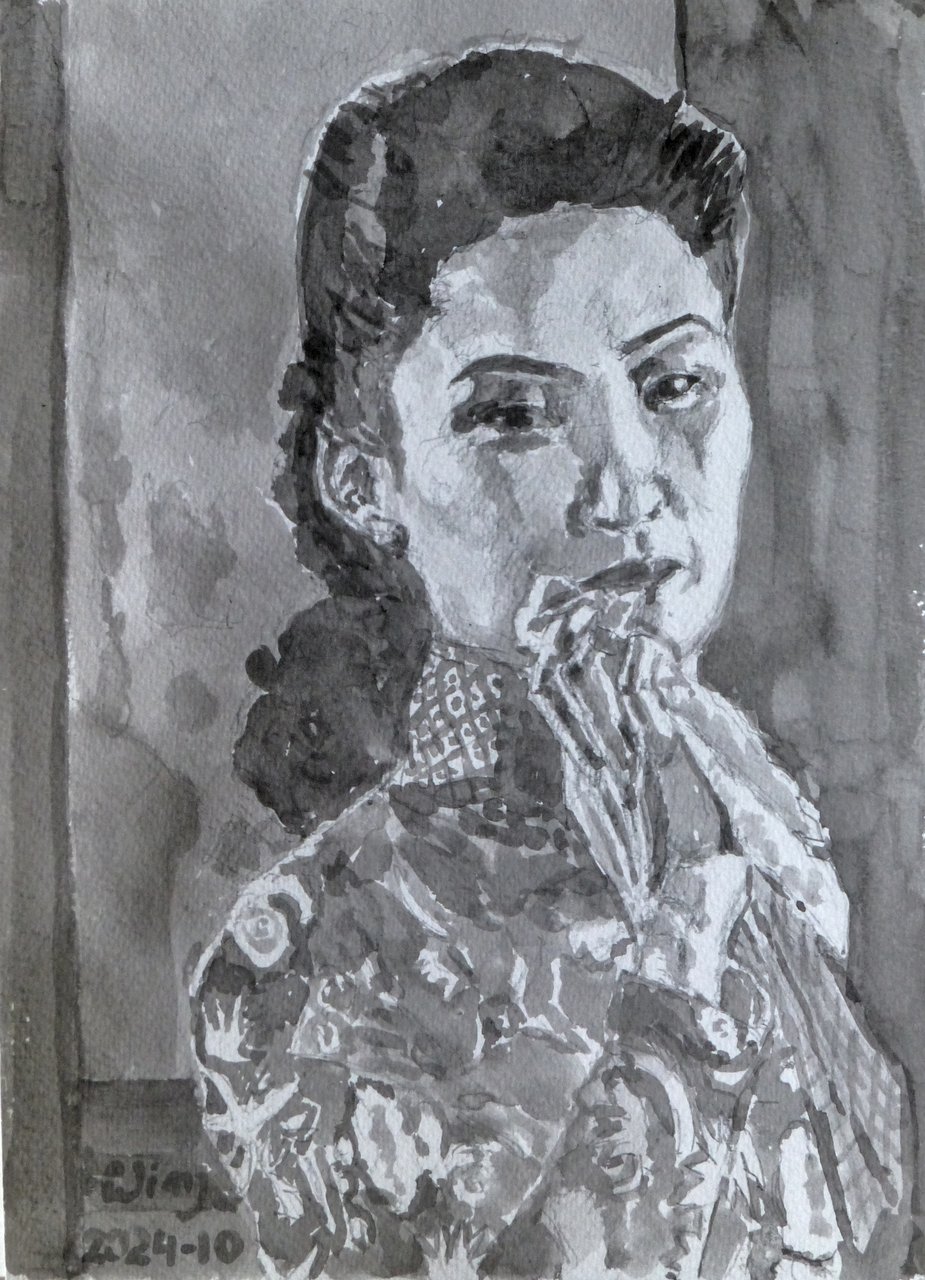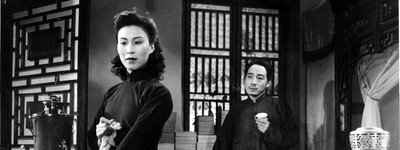One of my favourite films is “Spring in a small town”, (小城之春 xiao chéng zhī chūn) from 1948, directed by Fei Mu. It’s a story of an unhappy marriage and an old love turning up unexpectedly. I love the way it is filmed, both in terms of pace and framing, and how the story is told in a very understated manner.
This is probably one of the most famous Chinese films ever made and lot has been written about it, reviews, essays, in-depth analysis of what makes it so special. I don’t want to repeat all that and instead provide some context to the drawing I made from a scene in the film, and also focus on a few points about the film and the actors that I found particularly interesting.
About the characters
The film only has five characters: the protagonist Zhou Yuwen (周玉紋), her husband Dai Liyan (戴禮言), his younger sister Dai Xiu (戴秀), their servant Lao Huang (老黃) and the visitor Zhang Zhichen (章志忱).
The film opens with Yuwen walking along the top of the old city wall. In voice-over, she says:
住在一個小城裏邊
每天過着沒有變化的日子
早晨買完了菜
總喜歡到城牆上走一趟
這在我已經成了習慣
人在城頭上走着
就好像離開了這個世界
眼睛裏不看見什麼
心裏也不想{着,著}什麼
要不是手裏拿着菜籃子
跟我先生生病吃的藥
也許就整天不回
Living in a small town…
Living a life where nothing ever changes…
Every day after I’m done buying groceries,
I like to walk for a while along the top of the city wall.
It’s already become a habit with me.
Walking along the city wall, I feel as if I’ve left this world behind…
My eyes see nothing…
My mind is empty…
If not for the vegetable basket on my arm,
and the medicine for my husband in my hand,
I might not go home all day.
And then:
Our Dai family house was mostly destroyed by artillery fire. No one can live in the main house anymore. I live with him in the garden courtyard. We each have our own room.
And further:
Liyan doesn’t see me more than once a day. We never say more than a couple of words to each other. I leave in the morning to buy groceries. He goes into the garden where no one can find him.
He says he has tuberculosis. I think it’s neurosis.
I don’t have the courage to die. He doesn’t seem to have the courage to live.
And a final snippet:
Her brother can never forget the splendor of the past, but his sister feels no nostalgia for the past. The decline of the Dai family means suffering and despair for Liyan, but his sister feels no sense of disappointment.
When I come home after buying groceries, I go into the kitchen. Then I get the medicine I bought and bring it to Liyan. When we see each other, maybe we won’t exchange even a single word before parting again.
Then Liyan calls her:
Yuwen…
and the voice-over comments:
Now he calls to me…
There is another important scene to understand the story and the drawing. Yuwen gives Liyan his medicine but he throws it on the ground in a fit of anger.
Yuwen: Why are you acting like that, Liyan? Why so much anger all the sudden?
Liyan: I don’t know why either. I can’t help myself. I’m a failure. The family fortune handed down for generations disappeared on my watch. That’s one thing. And we’ve been married for eight years, of which I’ve been sick for six and lived separate from you for two or three. My little sister is still young and you’ve been the only one around to take care of her. I don’t want to see you continue to suffer like this, spending your days doing needlework in little sister’s room, living such a desolate life, day after day. I don’t know if it’s better if you leave me or if I leave you…
What happens next is that Zhang Zhichen comes to visit. He is a friend of Liyan but before she married, ten years earlier, he and Yuwen were in love.
The drawings
The ink
I got a new inkstick as a present from one of my students and decided to use it for a large drawing.

The ink stick comes in a nice wooden box with the label
中國徽墨
黄山市徽州曹素功墨廠
which means
China Hui Ink
Huangshan Huizhou District Cao Sugong Ink Factory
This is the same Cao Sugong Ink Factory I talked about in my article about my other ink sticks. Huizhou is a historical region in Anhui Province and this is where Cao Sugong was established in 1667. The company moved to Shanghai in 1864. So by an interesting coincidence, there is a connection between the ink sticks I got long ago and the new one.
A trial drawing: a portrait of Yuwen
I made two drawings from scenes of the film. The first one is a small portrait of Yuwen dressed in an elaborately embroidered dress and holding a handkerchief in front of her mouth. This is based on a still from the film, just before Yuwen says
As if drunk, as if in a dream. Now the moon rises high in the sky and there’s a slight breeze.
The scholar Susan Daruvala comments:
[…] the word dream immediately conjures up the most famous Chinese play, The Peony Pavilion by Tang Xianzu, a contemporary of Shakespeare’s. The beautiful heroine of the story falls asleep in the garden and dreams of her lover, whom she has never met in real life. Consumed by this passion, she wastes away and dies, leaving behind a picture of herself. In the end she manages to appear in a dream to the man, who has fallen in love with the picture. He has her exhumed, and brings her back to life. In the film we see a brilliant shot of the bright moon and then hear Yuwen’s voiceover “Now the moon is already high in the sky and there’s a slight breeze,” which is a metaphor for her mounting desire and fluttering heart. When she gets to Zhichen’s room and walks in and lights the candle, we feel she is ready to seduce him, and he resists, leaving the room and eventually locking the door with her inside. [1]
I made it as a test for the new inkstick and also to see if I could still draw accurately. It is on A4 format (21 x 29.7 cm) 300 g/m² cold pressed “not” (rough) paper in a spiral-bound pad from Cass Art.


The second drawing: Yuwen and Liyan
The second drawing is a larger one, a double portrait of Yuwen and Liyan. It is based on a publicity photograph, the banner picture shows part of it. The scene as such does not occur in the movie but it is a summary of the scene that occurs after Yuwen and Zhichen have had a tense conversation which ends with Yuwen saying:
After I go back, I’ll tell Liyan that I came to talk with you. I wouldn’t want to do anything behind his back. See you tomorrow…I was just playing with you. Don’t be mad.
Yuwen takes the bottle out of a drawer and counts out the sleeping pills, while the camera pans to Liyan who is watching her. She takes them to him with a cup of tea but he does not take the pills. She turns away, he wants to stop her but then doesn’t. He gets up and walks from his chair to the bed and sits down on it, all the while staring at her. She comes to the bed and Liyan discusses with her the possibility of his sister Xiu marrying Zhichen. When Yuwen gets up to leave, Liyan puts his hand on her arm and asks her to stay but she leaves, Liyan’s gaze following her.
The scholar Ling Zhang comments on the scene:
Similarly, the single use of the handkerchief in the film is quite revealing (51’50-54’30). When Liyan asks Yuwen to be a matchmaker for Zhichen and Dai Xiu, Yuwen crumples the handkerchief between her palms in an outward revelation of suppressed nervousness, calling upon yet another convention of traditional Chinese theatrical performance. According to Wei Wei, Fei Mu was skilled at observing actors’ everyday life behaviors and encouragin them to build their personal traits into the characters they played, another form of improvisation. [2]
The expressions on the faces of both characters are what interested me. Yuwen seems at first very composed, but it is only strong self control that allows her to keep her emotions in check. Liyan is ill and therefore is not as emotionless. I think his face and the way he looks at Yuwen, turned away from him, show sadness, longing and despair.
I used the rough watercolour paper I like (Fabriano Artistico, 300 g/m² cold pressed “not”), about 50 cm x 70 cm. I set up the drawing in ordinary HB pencil and added some indicative shading with Tombow MONO 100 graphite lead pencils. I used a grid to make it easier to match the original picture.

I applied the Chinese ink using a medium-size calligraphy brush. The brushes I have are quite old. The characters say 火炬牌 and 纯羊毫大楷上海工艺, which means “Torch brand” and “pure goat hair large regular script Shanghai craft”. This kind of brush doesn’t allow the precision of a typical watercolour brush but that is precisely why I use it. Not having full control over the stroke is part of the approach. I don’t want to recreate the photograph on paper, I want the pencil work and brush stroke to be visible and I want a degree of uncertainty on the result.

The actors
Liyan
I could not find much about the actor Yu Shi (石羽) who plays the husband Dai Liyan. He was born in 1914 in Tianjin (close to Beijing) and was of Hui ethnicity. He went to the Nanjing National Drama School in 1936 and from then on worked as a professional theatre actor. In 1946, he joined the Xinhua Film Company, and in 1948 he appeared in Spring in a Small Town. He went on to become a theatre director and later served as director of the Arts Council, director of the Chinese Dramatists’ Association and member of the National Committee of the Chinese People’s Political Consultative Conference. He died in 2008
Yuwen
There is a lot more information to be found about Wei Wei (韋偉 Wéi Wěi) who plays the wife Zhou Yuwen (周玉紋 Zhōu Yùwén). She was born in 1922 in Zhenjiang (not to far from Shanghai) as Miao Mengyin (缪孟英 繆孟英).
About how she got into acting she said [3]
“I went to work as a typist, but all I wanted was to fight the Japanese. One day I saw a play called Metamorphosis, directed by Huang Zuolin and starring Shi Hui, Han Fei and Huang’s wife Dan Ni. I cried. It was about resisting the Japanese invasion and I thought I could fight the Japanese doing just that. So I joined the company which was known as the Shanghai Art Troupe.”
This was the theatre company founded by Fei Mu and when the war was over, they went back to making films and so Wei Wei became a film actress.
About here stage name, she said
“I’m called Wei Wei because theatre actresses all had stage names. The best actresses in Shanghai at the time were Xia Xia, Lan Lan and Ying Yin. I admired them and wanted to have a name with repeated sounds, so I could be as good as they were. When rickshaw men asked people to give ways, they wouldn’t say anything but yelled: ‘Wei! Wei!’ (meaning ‘Hey! Hey!) I thought that was good, like asking people to make way for me on stage.”
The director’s aesthetic views
Fei Mu, the director, explained in an interview “If a film wants to attract the audience, it must assimilate the audience with the people in the story. In order to achieve this goal, I think it is necessary to create “atmosphere” in the story”. The term translated as “atmosphere” or “air” is kongqi 空气 in Chinese, comprised of kong 空 ( “empty”) and qi (气 “vital energy” or “living spirit”). It is a kind of haziness and ambiguity artificially made by space-time creation, contrast and sound effects, and the photography itself, making the film feel like a non-deterministic and multi-sense aesthetic experience.
He was also strongly influenced by the “narrative, analogy and association” theory of Chinese poetry as employed in the Book of Songs (a classic collection of Chinese poetry dating from the 11th to 7th centuries BCE) , the formalisms of Chinese opera and the aesthetics of Chinese painting. In particular he mentions the use of blank, unpainted spaces, a technique know as liubai 留白 (“leaving blank”), suggesting things rather than showing them.
He also favoured long takes: the average shot length is more than twenty-four seconds. Hollywood films of the same era had shot lengths of on average thirteen seconds, and contemporary films just five seconds. His shots usually employ lateral panning or tracking rather than cutting to closer shots of different characters, and dissolves rather than cuts.
Filming during the Second Sino-Japanese War
During the Second Sino-Japanese War, Fei Mu kept on making films as much as he could. In 1936, just before the start of the war, he made “Blood on Wolf Mountain” which tells of a village terrorised by a pack of wolves. The film is usually seen as a direct allegory of the conflict between the two countries.
The Second Sino-Japanese War was in full force in 1937 and, by November of that year, Shanghai was occupied by the Japanese.
During the following “Solitary Island” period (1937-1941), the Chinese sections of Shanghai were occupied by the Japanese while the International Settlement and the French Concession remained free. The films of the period were made in these free zones. During 1937, Fei managed to direct four movies which all took the form of Chinese opera. The four films were deeply nationalistic and were meant to fight against the Japanese hegemony, a common theme in the films of the time.
In 1941, Japan invaded the foreign concessions of Shanghai and took over the film industry. Many artists fled to Hong Kong, but Fei stayed behind to care for his ailing mother. Not wanting to work with the Japanese, Fei changed his focus to working in the theatre and directed numerous plays, first for the Tianfeng Theatre Company and later for the Shanghai Art Troupe, which he founded himself.
It wasn’t until after the war, in 1946, that Fei Mu could make his next film — and it didn’t succeed. “The Magnificent Country” was meant to be a story of the communists and nationalists forming a coalition to rebuild China after the war. However, the breakdown of the negotiations between the Communists and the Kuomintang later that year resulted in the Chinese civil war, destroying Fei Mu’s idealistic vision of China and the film was never finished. As a result, “Spring in a Small Town” reflects Fei Mu’s bitter mood at that time. He hoped to awaken people (mainly intellectuals) to the hope of rebuilding the country after its collapse through the expression of his bitterness.
The era and location
The film was made during a brief period of bloom for the Chinese film industry in Shanghai after the terrible “War of Resistance against Japanese Aggression” (1937-45) and before the proclamation of the People’s Republic of China (PRC) in 1949. This period was also the final period of conflict in the Chinese Civil War.
In the film, which is set in 1946, the family house of husband Dài Lǐyán is mostly ruined after the long war and is uninhabitable, so that the family lives in rooms in the garden courtyard.
The film was filmed on location in Songjiang, a water town then about an hour from Shanghai (now it is a suburban district of Shanghai). This whole area saw very heavy fighting and destruction at the start of the war, and a lot of the buildings were in ruins.
The making of the masterpiece
“Spring in a Small Town was done very quickly, in about 40 working days. The small town was in Songjiang. Mr Fei drove one of the cars; there were another car and a couple of trucks and that’s it. Most of us were newcomers, including Li Wei, Zhang Hongmei, and scriptwriter Li Tianji.” (from an interview with Wei Wei in [3])
When the film came out in 1948, it was criticised for being political indifferent and considered petit-bourgeois and out of touch with the times and although it was not banned, it didn’t do well and was pulled from distribution after a very short run. When the Communists took over in 1949, the director moved to Hong Kong. He died a few years later. For a long time after, the film was mostly forgotten until after the end of the Cultural Revolution. In 1980, the China Film Archive issued a new print and in 2014, the British Film Institute released a restored version of the film.
References
[1] ‘The Courage to Live’: Woman, morality and humanism in Fei Mu’s Spring in a Small Town, Susan Daruvala, University of Cambridge, 2007, presented at “Cinema China – A nationwide festival of Chinese film”
[2] Sound Images, Acoustic Culture and Transmediality in 1920s-1940s Chinese Cinema, Ling Zhang, University of Chicago, PhD dissertation, 2019
[3] From small town to the big screen: a retrospective on Wei Wei, Hong Kong Film Archive, 2017
Further reading
- History Repeating in Spring in a Small Town, Sarah Woodland, University of Melbourne, 2018
- An Exploration of the Changing Reputation of Spring In A Small Town at Different Times, Kaihui BI, University of Southampton, 2024
- A Spring That Brought Eternal Regret: Fei Mu, Mei Lanfang, and the Poetics of Screening China, David Der-wei Wang, Harvard University, 2013
- Thinking, Feeling and Experiencing the “Empty Shot” in Cinema, Siying Duan, Shanghai University, 2021
- FEI Mu Director, Screenwriter, Hong Kong Film Archive
- The Poetic and Aesthetic Presentation of “Spring in a Small Town” from the Perspective of Chinese Traditional Culture, Yiwen Zhang, Chinese National Academy of Arts, 2021
The banner is a crop of the photograph on which the drawing is based. It shows a wider view of the room.
